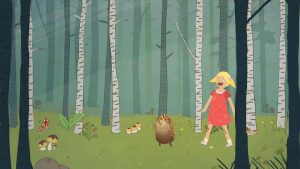Уро́к 2
2.3 Грамма́тика – Masculine Nouns with stressed -у́
Грамма́тика
There is a small subset of masculine nouns in Russian that get a stressed -у́ ending in the Prepositional Case instead of the -e ending. They are mentioned here early on because they are very high frequency words and are often used in the Prepositional Case. Luckily there are just a few and they’re fairly easy to memorize.
Molly and I talk about this in the following video at the 3:00 mark:
Masculine Nouns with stressed -у́
| пол ‘floor’ | на полу́ ‘on the floor’ |
| шкаф ‘closet / wardrobe’ | в шкафу́ ‘in the closet’ / ‘wardrobe’ |
| мост ‘bridge’ | на мосту́ ‘on the bridge’ |
| лес ‘forest’ | в лесу́ ‘in the forest’ / ‘woods’ |
| сад ‘garden’ | в саду́ ‘in the garden’ |
| у́гол ‘corner’ | в / на углу́ ‘in / on the corner’ |
| аэропо́рт ‘airport’ | в аэропорту́ ‘at the airport’ |
 |
1. Где су́мка?
Су́мка на полу́. ‘The purse is on the floor.’ |
 |
2. Где ве́щи?
Ве́щи в шкафу́. ‘The things are in the closet.’ |
 |
3. Где маши́ны?
Маши́ны на мосту́. ‘Cars are on the bride.’ |
 |
4. Где Поли́на и Оле́г?
Они́ в лесу́. ‘They are in the forest.’ |
 |
5. Где он?
Он стои́т на углу́[1]. ‘He is standing on the corner.’ |
 |
6. Где вы?
Я в аэропорту́. ‘I am at the airport.’ |
 |
7. Где ко́шка?
Ко́шка в саду́. ‘The cat is in the garden.’ |
Пра́ктика!
Где ко́шка? Work through this set to practice the Prepositional case and describe where the cat is! You should NOT include stress marks in your answer!
Media Attributions
- Duffel bag beside white and brown chair
- AI generated dressing room © Fabien Raquidel
- Budapest chain bridge traffic © hpgruesen
- Forest Scene © Liberal Arts ITS, The University of Texas at Austin is licensed under a CC BY-SA (Attribution ShareAlike) license
- © Mike Jones
- Airport airline traffic © Skitterphoto
- Cat, garden domestic animal
- Some nouns in Russian have what is called a ‘fleeting vowel’, which means that its presence alternates with the presence of an ending. In the Nominative угол ends in a consonant, or more specifically, it has a ZERO ending. In Prepositional Case, it gets an ending, causing the ‘fleeting vowel’ to disappear. These words will be noted and fleeting vowels as a general topic will be discussed in more detail later. ↵

